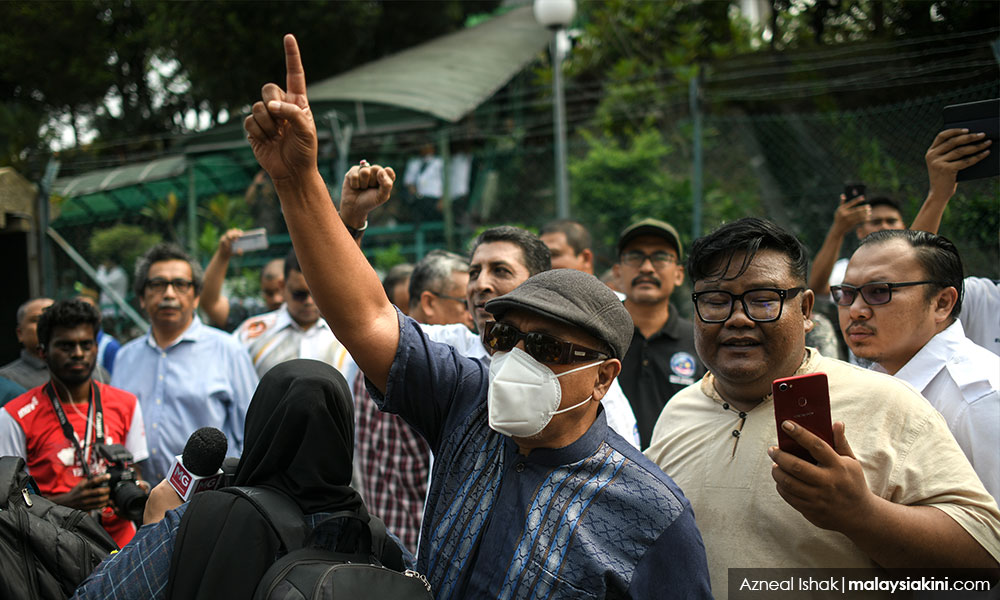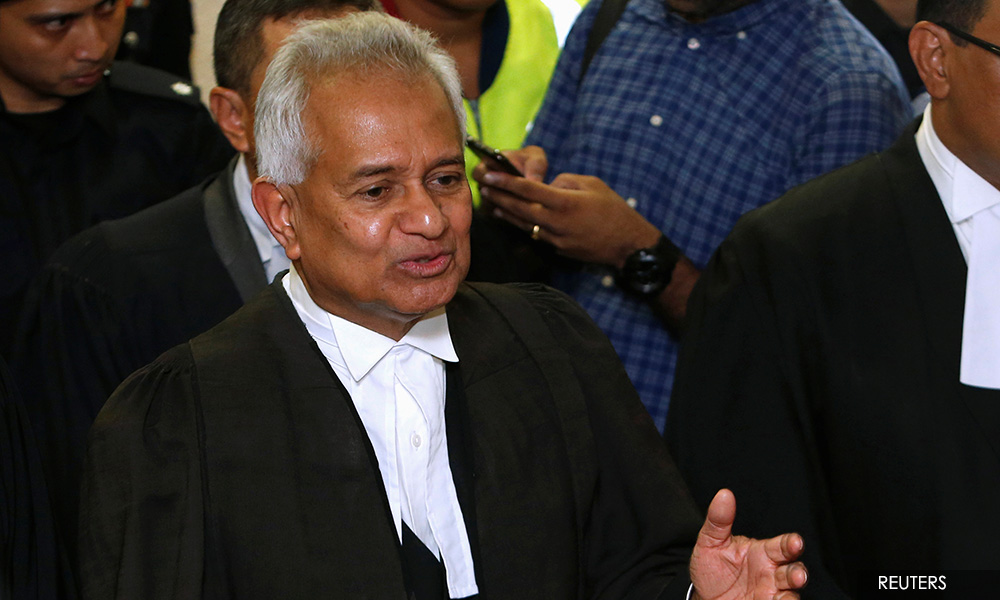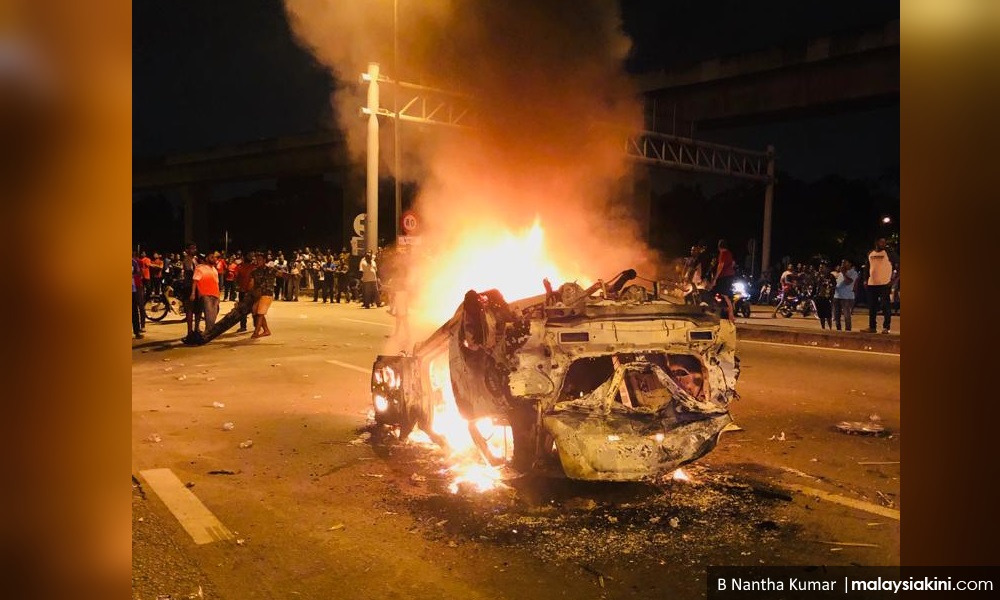
“If this rash and negligent action had not been resorted to, I believe there would not have been the clash between the Malay men and the Hindu devotees at the Sri Maha Mariamman Temple.”
- Home Minister Tan Sri Muhyiddin Yassin
Even before an investigation was carried out into the death of firefighter Muhammad Adib Mohd Kassim, the prime minister of this country had decided that it was murder.
The state security apparatus attempted to further a narrative that the Seafield temple incident was a fight between two groups of Indians, and politicians were warning the rakyat not to turn this into a racial or religious issue. They ignored their own advice and attempted to propagandise the death of Adib as some sort of epochal moment in Malay politics.
Before the historic May 9, 2018 general election (GE14) win, the then Pakatan Harapan opposition never had a problem bemoaning the narrative that our public institutions could not be trusted and that voting for Harapan would mean a rejuvenation of the trust we could have in our most vital of institutions.
The results of the inquest and the polemics coming from politicians before and after the inquest demonstrates that, for a certain segment of the rakyat, trust in our public institutions remains elusive.
PAS Youth deputy chief Fadhli Shaari wants criminal charges to be brought against the people responsible for the death of firefighter Muhammad Adib, but does this also include the police when the coroner claimed that Adib’s death was “also the failure of police to act at the time of the incident”?
Adib’s older brother, Muhammad Asyraf said that no civil suit was being considered because “who do we sue?” But the coroner ruled that the police were also liable, hence, the family could bring a civil suit against the PDRM. Why aren’t these pressure groups seizing on this opportunity to hold the police accountable, as they do the Attorney-General Tommy Thomas (below)?

We had Malay/Muslim rights groups, political parties and activists clamouring for a “criminal verdict” of some kind. And what they got was just that, that the fire fighter’s death was a result of a criminal act. Mind you, I have no idea how the figures of two or three people came about, but the result of this verdict seems to have appeased those clamouring for someone to blame.
Now politicians are telling the PDRM (which the inquest decided contributed to the death of Adib) to seek justice for the family of Adib and carry out an investigation. How exactly is the PDRM going to discover Adib’s alleged killers?
There are news reports stating that they will be re-interviewing persons of interests whom they cleared of any wrongdoing in the first instance. Meanwhile, we have public statements from the PDRM that they are on the case and that they will review their SOP when it comes to incidents like these.
At the heart of it is the reality that some Malaysians do not trust our public institutions. People pore over the statements of the coroner and point out flaws in the reasoning – legal or logical or both – and wonder if this verdict was about appeasement.
Sure, we can pore over the legalese about the procedural aspects of the inquest, conclusions drawn and reliability of the testimonies of the witnesses, but this seems more like a public scapegoating of unknown people. A convenient result for an inconvenient incident.
The fact that unknown assailants were responsible for the death – and of course, the PDRM for their failure to act – means that we will never really know how Adib died or who was responsible. Of course, if you believe in the verdict, as Lim Guan Eng wants you too, then this is the end of this tragic episode. However, fact and history are not sympathetic enablers.

When you have groups propagandising the death of a firefighter in a rioting incident brought upon by thugs under the employ of corporate interests, who desecrated a temple, this is bound to become another flashpoint waiting to flare up again.
Jaringan Melayu Malaysia president Azwanddin Hamzah threatened to attack the Klang police station, made all sorts of unfounded allegations against Primary Industries Minister Teresa Kok and made derogatory statements against P Waythamoorthy, who went against the official narrative of the state when the issue first cropped up.
Not to mention the Christmas Day solidarity rally organised by far-right elements (and which included mainstream politicians from both sides of the political divide) to honour the death of the firefighter – politicians who also took the opportunity to make incendiary racial and religious statements.
No matter how you try to spin it, the legacy of Adib, especially among rational, thinking Malaysians, is one of divisiveness and political opportunism. The Malay far-right, with the assistance of Bersatu and other Harapan politicians, in attempting to make him some sort of martyr, saw to this. About the only good thing that has come out of this is that Adib’s family has some closure.
We still have not discovered what happened in the events leading up to Adib’s death. The coroner said that the lack of action by the PDRM contributed to Adib’s death. While this is a damning indictment, what about the police presence or lack thereof during the time when thugs attacked the temple? What about the police response time then?
What the result of this inquest reveals is that when it comes to the action of the state, there is a segment of the rakyat who are still deeply mistrustful of public institutions. It also reveals the racial and religious divisions when it comes to race and justice in this country.
No matter how much you tell people not to politicise this result, the reality is that for many people, the verdict of this inquest was a political one, not a factual or legal one.
Keep in mind the quote that opens this piece. The home minister had said that investigations by the police had revealed that a lawyer working for the developer had hired thugs to take control of the situation, and the role of the developer in this mess is yet to be determined.
So, who knows, the family of the late Adib may have another potential party to sue for the death of their kin. If all those Malay advocacy groups, politicians and race-baiting charlatans were really interested in honouring the memory of Adib, they would help the family claim justice or compensation from parties which the inquest and public statements by the home minister point to as culpable in the death of Adib.
This will not happen, of course, because they are more interested in ensuring that the trust in public institutions is constantly validated.
S THAYAPARAN is Commander (Rtd) of the Royal Malaysian Navy. A retired barrister-at-law, he is one of the founding members of Persatuan Patriot Kebangsaan. - Mkini



No comments:
Post a Comment
Note: Only a member of this blog may post a comment.